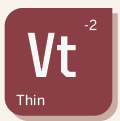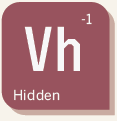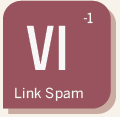So far, we’ve discussed the positive signals that make up the Periodic Table Of SEO Ranking Factors. But there are also some negative factors that you should avoid. A word of reassurance. Very few people who believe they’ve spammed a search engine have actually done so. It’s hard to accidentally spam. Search engines also look at a variety of signals before deciding if someone deserves a harsh penalty.
OK, let’s talk about things not to do!

Vt: “Thin” or “Shallow” Content
It’s a brand new penalty, because Google until recently couldn’t even decide if just having so-so content really should be treated the same as overt spam techniques.
But when Google rolled out its “Panda” update in February 2011, having what it described as “thin” or “shallow” content, content that was lacking substance, became a reason for that content to take a penalty hit.
To learn more about this, see some of our articles below:
- Google Forecloses on Content Farms With “Farmer” Algorithm Update
- Your Site’s Traffic Has Plummeted Since Google’s Farmer/Panda Update. Now What?
- Lessons Learned at SMX West: Google’s Famer/Panda Update
- The Farmer/Panda Update: New Information From Google and The Latest From SMX West
- Google Rolls Out Its Panda Update Internationally And Begins Incorporating Searcher Blocking Data
- It’s Panda Update 2.1, Not Panda 3.0, Google Says
- Impacted By Google’s Panda Update? Google Asks You To Consider This…

Actually, no, it doesn’t. But “keyword stuffing” like this could get you penalized.
How often is too often? There’s no correct answer here, but you’d really have to go to extremes to cause this penalty to kick in. It’s most likely to happen to non-SEOs who just don’t know better and might decide to paste a word many times in a row, typically at the bottom of a web page.





